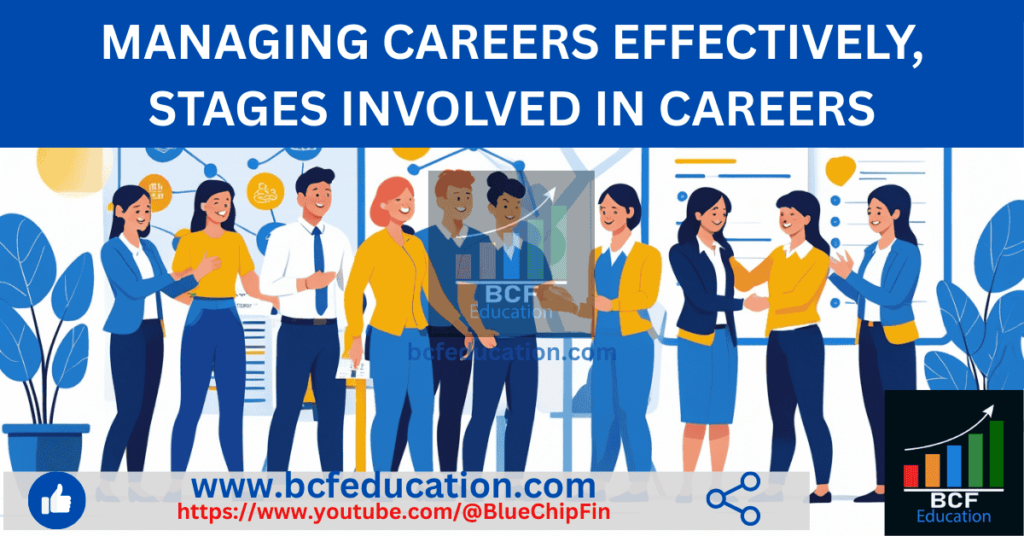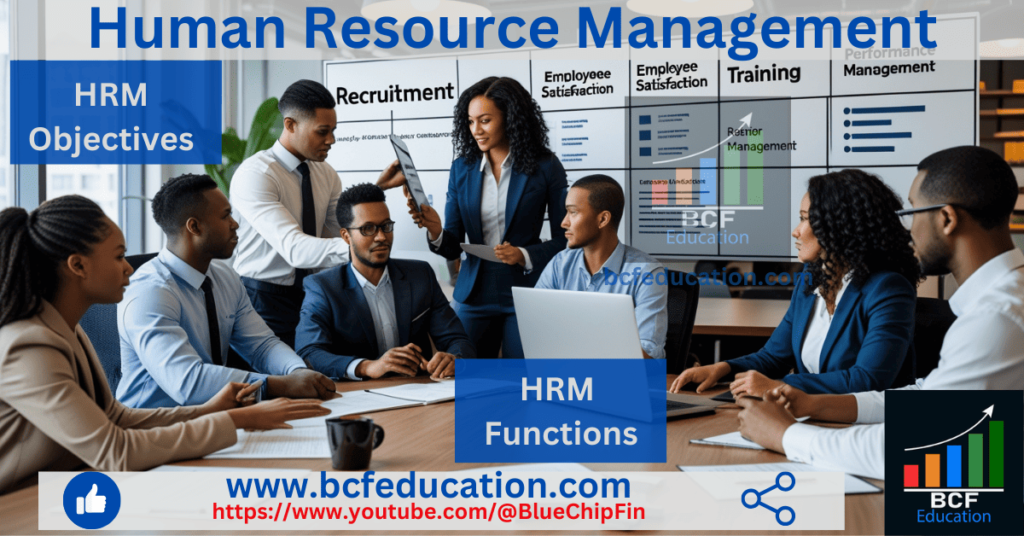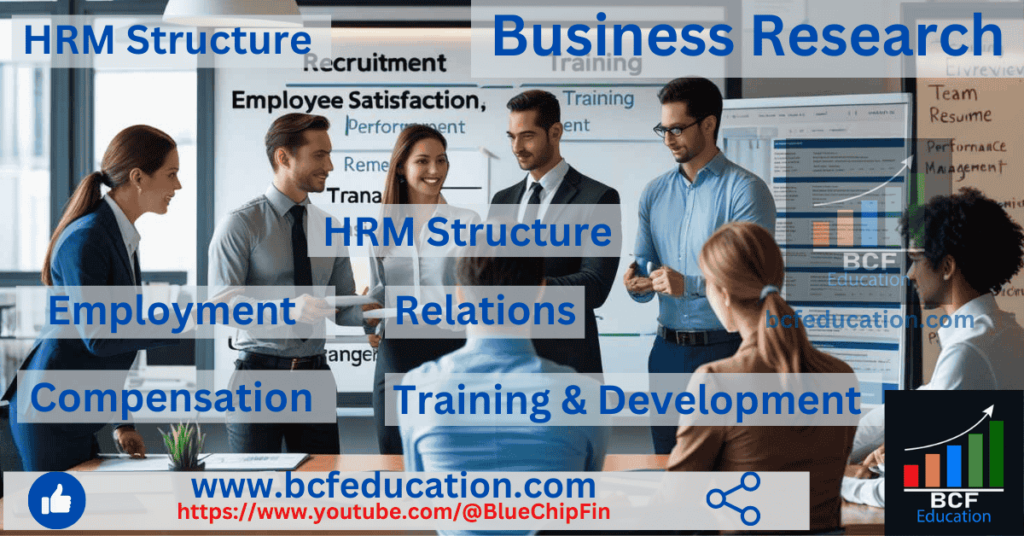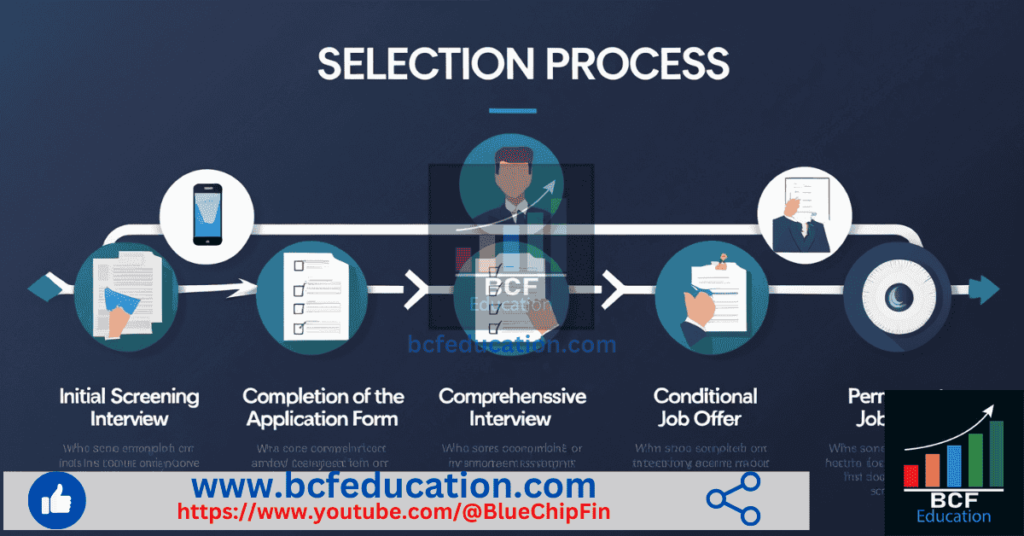9. HRM Unlocked Managing Careers effectively, Stages Involved in Careers. Managing a career effectively is crucial for both employees and organizations. In this post, we explore the key stages of career development—entry, growth, maintenance, and decline/transition—and how HRM plays a vital role in guiding employees through each phase. Learn practical strategies for career planning, skill development, and overcoming challenges at different career levels. Whether you’re an HR student, professional or an employee looking to advance, this guide will help you navigate career management successfully!. This topic is equally important for the students of the subject Human Resource Management across all the major Universities such as MU, DU, PU & others & across all business & finance disciplines.
Table of Contents
9. HRM Unlocked Managing Careers effectively, Stages Involved in Careers
Traditional Stages Involved in a Career
Traditional Career Stages
Looking at careers in stages is a common way to understand how they develop. Most people start shaping their careers early in school and wind down as they approach retirement. There are five typical career stages: exploration, establishment, mid-career, late career, and decline. While this model is simple, the focus should be on the stages, not age. For example, someone switching careers at 45 may face the same challenges as a 25-year-old just starting out. On the other hand, a 45-year-old with 20 years of experience will have different expectations than someone new to the field.
Exploration
Before we even start working for pay, we make big decisions about our careers. Influences like family, teachers, media, and financial situations shape our choices. This stage ends when we move from school to work. Though it happens before employment, it’s still important—because here, we form expectations (some realistic, some not) about our careers.
Good career exploration means trying different fields to see what fits. Internships and co-op programs help by giving real-world experience. Even if you realize you don’t like a job, that’s still valuable. During this stage, we also develop work habits (like meeting deadlines) and social skills (like teamwork).
Establishment
This stage begins with job hunting and includes landing your first job, fitting in with coworkers, learning the role, and seeing early signs of success or failure. It’s full of uncertainty, with two main challenges: finding the right role and proving yourself.
Some people take years to find their niche, hopping between jobs. Others settle in faster. Either way, your first job likely won’t be your last.
The second challenge—making your mark—involves learning from mistakes and taking on more responsibility. You’re not at your peak yet, but you’re growing. It’s like hiking toward a hilltop—once you reach it, you’ve arrived.
Mid-Career
This is where many face their first big career challenges. Some keep climbing, some stay steady, and some lose motivation. Success here isn’t just about growth—it can also mean maintaining what you’ve built.
High achievers keep pushing for bigger goals (like moving from VP to CEO).
Plateaued employees stay productive but may focus more on life outside work.
Declining performers lose interest, sometimes leading to demotions or job changes.
For those struggling, a new role or challenge can sometimes reignite their passion.
Late Career
For those who kept growing, this stage can be rewarding—they’re respected mentors, sharing wisdom without the pressure to outperform. But for those who stagnated earlier, it can be tough, realizing they won’t achieve all they once hoped.
Many start thinking about retirement and life beyond work. Job flexibility may decrease, but personal life often becomes more important.
Decline (Late Stage)
Retirement is hard for almost everyone, especially those who were highly successful. Stepping away from a long career means losing part of your identity. For others, retirement can be a relief from workplace frustrations.
Nowadays, many keep working past traditional retirement age—whether for money, health benefits, or simply because they enjoy it. Companies value older workers for their experience and reliability.

Suggestions to Manage Career Effectively
Enhancing Your Career
Think of managing your career like running your own business—even if you work for a big company. In today’s fast-changing job market, staying flexible and keeping your skills sharp is key. You are in charge of your career success. Here’s how to take control:
Know Yourself
Be honest about your strengths and weaknesses. What unique skills do you bring to the table? Self-awareness is the first step to smart career planning.
Manage Your Reputation
Don’t be a bragger, but don’t stay invisible either. Make sure people inside and outside your company know about your wins. Visibility matters.
Build & Maintain Network Contacts
Jobs today change fast, so having a strong network is crucial. Join professional groups, attend events, and connect with people in your field.
Internships help
They give you real-world experience, help you understand company culture, and can even lead to job offers. Many schools now require internships because employers value hands-on experience.
Keep Your Skills Current
Focus on learning skills that are in demand—not just ones that only matter at your current job. The more adaptable your skills, the more opportunities you’ll have.
Balance Specialist & Generalist Skills
Stay sharp in your specialty, but also develop broader skills (like leadership or problem-solving). This makes you more adaptable in a changing job market.
Document Your Achievements
Employers care more about what you’ve accomplished than just your job titles. Look for roles that challenge you and give you measurable results to showcase.
Always Have a Backup Plan
Jobs can change unexpectedly—your team might shrink, your project could get cut, or your company might merge. Hope for the best, but be ready for the unexpected.
Final Thought
Your career is yours to shape. Stay proactive, keep learning, and build relationships—so no matter what happens, you’re always moving forward.
FAQ’s
1. Who is responsible for managing careers?
Managing your career is primarily your responsibility. While companies can offer support—like training, mentorship, and growth opportunities—they won’t build your career for you. It’s up to you to take charge of your professional path.
2. What is a career?
A career is the journey of jobs and roles a person holds over their working life. It’s not just about one job—it’s the progression of experiences, skills, and growth over time.
3. How do organizations and individuals view careers differently?
Organizations focus on career paths—creating opportunities (like promotions) to retain talent.
Individuals focus on personal career goals—figuring out what they want and how to get there.
4. What’s the difference between career development and employee development?
Career development = Long-term growth (planning for future roles, skills, and success).
Employee development = Short-term skills (training for current or near-future job needs).
5. Why is career development important for companies?
Career development helps organizations by:
✔ Ensuring they have skilled employees ready for future roles.
✔ Attracting and keeping top talent.
✔ Supporting diversity and equal growth opportunities.
✔ Reducing employee frustration and turnover.
✔ Boosting company culture and reputation.
6. What are the five traditional career stages?
Exploration – Trying out different jobs (often early career).
Establishment – Building skills and stability.
Mid-career – Peak performance (may face plateaus).
Late-career – Mentoring others, preparing for transition.
Decline – Reduced work involvement (near retirement).
7. What are Holland’s vocational preferences?
These are six work personality types:
🔹 Realistic – Hands-on, practical (e.g., engineers, mechanics).
🔹 Investigative – Analytical, problem-solving (e.g., scientists, researchers).
🔹 Artistic – Creative, expressive (e.g., writers, designers).
🔹 Social – Helping, teaching (e.g., teachers, counselors).
🔹 Enterprising – Leading, persuading (e.g., entrepreneurs, salespeople).
🔹 Conventional – Organized, detail-oriented (e.g., accountants, administrators).
8. How do personality types affect job fit?
Personality tests (like Myers-Briggs) measure traits like:
Extrovert vs. Introvert – Do you thrive in teams or solo work?
Sensing vs. Intuition – Do you prefer facts or big-picture ideas?
Thinking vs. Feeling – Do you decide with logic or emotions?
Judging vs. Perceiving – Do you like structure or flexibility?
Matching your personality to the right job leads to better satisfaction and performance.
9. How can you manage your career effectively?
✅ Know yourself – Understand your strengths and goals.
✅ Build a strong reputation – Be reliable and professional.
✅ Network – Stay connected with colleagues and mentors.
✅ Stay updated – Keep learning new skills.
✅ Balance specialization and versatility – Be great at your role but adaptable.
✅ Track achievements – Document successes for promotions/resumes.
✅ Stay open to opportunities – Don’t limit yourself too early.

Related Articles
What is Human Resource Management, Objectives and Functions of HRM.
Structure of HR Department and Employee relation function
Steps involved in the Selection Process
8. Unlock HRM, Socialization, Assumptions, and Socialization Process
8.1 Unlock HRM, Employee Training, Training vs. Development, & Best Evaluation Methods in HR





